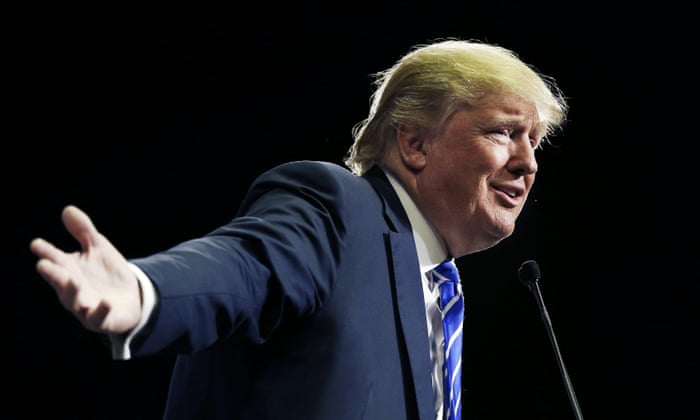Front-runner for Republican presidential nomination makes announcement as outcry over his suggestion that Muslims should be banned from US continues.
Donald Trump’s comments about Muslims were not endorsed by Netanyahu, but Israel’s prime minister had agreed to meet any US presidential candidate who visited Israel, his office said.
Donald Trump has said he will “postpone” a trip to Israel and a meeting with the country’s prime minister, Binyamin Netanyahu, until “after I become president of the US”.
Netanyahu had on Wednesday confirmed he would meet the frontrunner for the Republican presidential nomination to succeed Barack Obama in the White House despite an international outcry over his suggestion that Muslims should be banned from entering the US.
Several hours after confirming the meeting, Netanyahu’s office tweeted that the prime minister rejected Trump’s comments about Muslims but had agreed to meet any US presidential candidate who visited Israel.
 |
| Donald Trump’s comments about Muslims were not endorsed by Netanyahu, but Israel’s prime minister had agreed to meet any US presidential candidate who visited Israel, his office said. Photograph: John Locher/AP |
Trump’s visit had been opposed by dozens of Israeli MPs – both Jews and Arabs – after his remarks drew condemnation across the Israeli political spectrum.
The cancellation also followed reports in the Israeli media that Trump had requested a visit to the Haram al-Sharif/Temple Mount religious site, revered by Muslims and Jews alike, and home to the al-Aqsa mosque – one of the most important sites in Islam.
Some 37 Israeli MPs had signed a letter asking that Trump not be allowed to visit in light of his remarks. The letter, drafted by MP Michal Rozin, and mainly signed by opposition lawmakers, said that, “while leaders around the world condemn the Republican presidential candidate’s racist and outrageous remarks, Netanyahu is warmly embracing him” and any meeting would “disgrace Israel’s democratic character and hurt its Muslim citizens”.
Equally damaging for Trump was the fact that Israel’s rightwing energy minister, Yuval Steinitz, one of Netanyahu’s closest political allies, had weighed in, criticising Trump’s remarks.
“I recommend fighting terrorist and extremist Islam, but I would not declare a boycott of, ostracism against, or war on Muslims in general,” Steinitz told Israel’s Army Radio.
Explaining his decision Trump, who leads opinion polls in the US Republican nominating race, told Fox News he decided to postpone because “I didn’t want to put him [Netanyahu] under pressure.”
“I also did it because I’m in the midst of a very powerful campaign that’s going very well and it (the trip) was not that easy to do,” Trump added.
Netanyahu’s office insisted it had not intervened over the cancellation and had not spoken to Trump about his decision.
Trump’s proposed visit had clearly created problems for Netanyahu, whose office had declined to comment on Tuesday about the billionaire’s intended trip, then said he was still welcome on Wednesday.
By Wednesday evening, however, Netanyahu was seeking to distance himself more forcefully from Trump. A statement released by the prime minister’s office said: “The State of Israel respects all religions and protects stringently the rights of all its citizens. At the same time, Israel is struggling with extremist Islam that is attacking Muslims, Christian and Jews as one and is threatening the entire world.”
The cancellation is a blow to Trump, with Israel treated as a regular campaign stop for many US presidential candidates.
As Noah Pollak, the executive director for the Emergency Committee for Israel said: “Israelis appreciate American moral support and will always give our politicians a gracious reception. For the candidates, visiting is an easy way to to be seen showing support for a close ally and gaining exposure to Middle East policy issues.”
However, Pollak pointed out “trashing anyone who disagrees with him works for Trump domestically, but it won’t work with the prime minister of a close ally who is especially beloved by Republicans. Netanyahu criticized Trump, and Trump can’t attack him. The trip would have been humiliating, so he bailed.”
Underlining the hints that difficulties and tensions around his proposed trip, Trump – in yet another of the brazen untruths that have become the hallmark of his campaign – had on Wednesday attempted to deny he had said he would be meeting Netanyahu despite the fact that the comment had been recorded.
Asked about comments he made at a rally last week in which he said that he would be meeting with Netanyahu, Trump insisted, “I didn’t say that, no.”
In reality, however, Trump told a Virginia rally last week “I’m going to Israel, and I’ll be meeting with Bibi Netanyahu, who’s a great guy.”
















